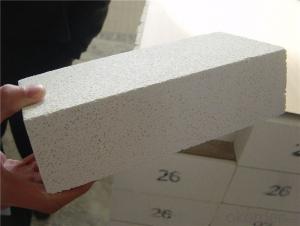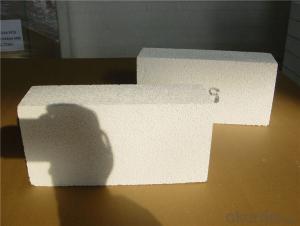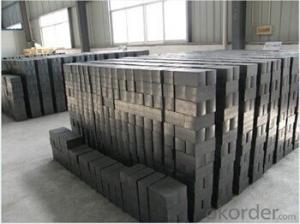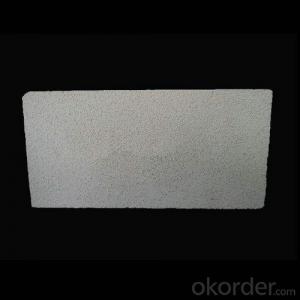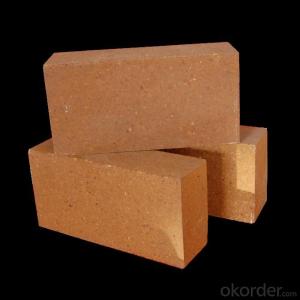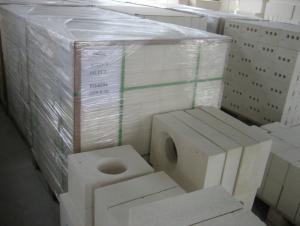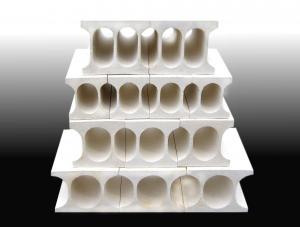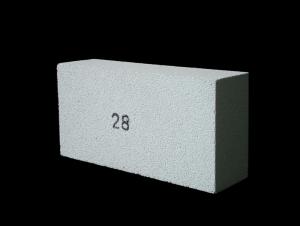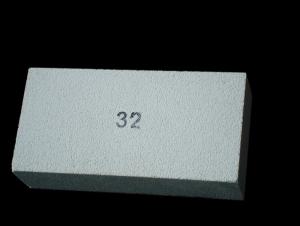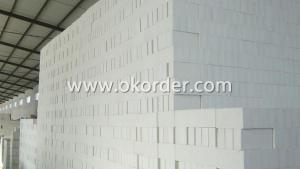Standard Size Fire bricks in refractory materials for foundry & Industry
- Loading Port:
- Tianjin
- Payment Terms:
- TT OR LC
- Min Order Qty:
- 20 m.t.
- Supply Capability:
- 10000 m.t./month
OKorder Service Pledge
OKorder Financial Service
You Might Also Like
CNBM conforms strictly to the requirements of ISO 9000 quality control system during the production. MSDS is also available if you want. The thermal insulation fire clay brick meet with the requirements of ASTM & JIS standards. So please stay cool with our quality.
Application
Insulating Fire Brick are used for the lining of converter, alternating current arc furnace, direct Current arc furnace and the ladle slag line, etc.
Insulating Fire Brick Technical index
Brand Quality | JM23 | JM26 | JM28 | JM30 | JM32 | |
Bulk Density (g/cm3) | 0.52 | 0.78 | 0.88 | 1.03 | 1.25 | |
1.2 | 1.6 | 2.1 | 2.5 | 3.5 | ||
Modulus of Rupture (Mpa) | 0.9 | 1.4 | 1.6 | 2.1 | 2.1 | |
-0.5 | 1400℃ -0.4 | 1510℃ -0.5 | 1620℃ -0.9 | 1730℃ -0.9 | ||
Thermal Expansion 1100℃(%) |
0.5 |
0.7 |
0.8 |
0.9 |
1.1 | |
Thermal conductivity(W/m.k)
| 400℃ | 0.14 | 0.27 | 0.32 | 0.41 | 0.49 |
600℃ | 0.16 | 0.29 | 0.34 | 0.43 | 0.50 | |
800℃ | 0.18 | 0.31 | 0.36 | 0.44 | 0.51 | |
1000℃ | 0.20 | 0.33 | 0.38 | 0.45 | 0.53 | |
Al2O3 | 37 | 58 | 67 | 73 | 77 | |
Fe2O3 | 0.7 | 0.7 | 0.6 | 0.5 | 0.4 | |
Equipment
1 unit of Ceramic Abrasive (SG Abrasive) pilot production line
2 units of Compact grain Abrasive pilot production lines
1 unit of high-end coated abrasives (abrasive cloth) production line
2 units of Boron Carbide production lines
3 large flexible crushing and sieving lines for grit production lines
2 units of 2000KVA furnaces for Boron Carbide fusion
6 units of 5000KVA-10000KVA dumping type electric arc furnaces for Brown Fused Alumina fusion
Company Advantage
(1)Long Insulating Fire Brick manufacture history: 25 years manufacturer
(2)Advanced equipment
(3)Diversification of production standards: ISO ANSI FEPA JIS ASTM
(4)Flexible payment: T/T L/C D/P D/A
(5)Professional marketing team and after-sale service
(6)Free sample
FAQs
Q1 |
What’s the transport method? |
A1 | FCL delivery goods with wooden pallet or wooden case by sea; If LCL delivery, must with wooden case; Sometimes need open top, flat rack or bulk cargo. |
Q2 |
What’s the required payment term? |
A2 | Generally 30% TT as the prepayment, 70% TT before delivery. If need, 100% Irrevocable Letter of Credit or negotiation. |
Q3 |
Which country are our products exported to? |
A3 | Apart from entire Chinese market, the US, Russia, Japan, Korea, Australia and some Southeast Asian Nations. |
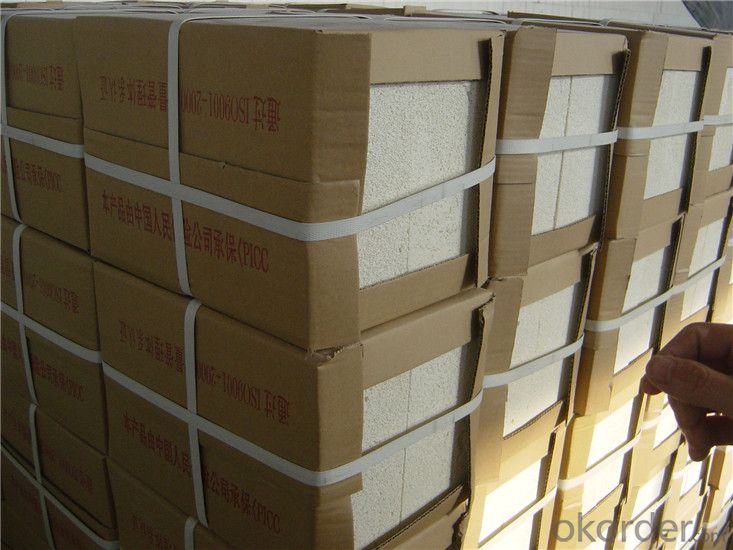
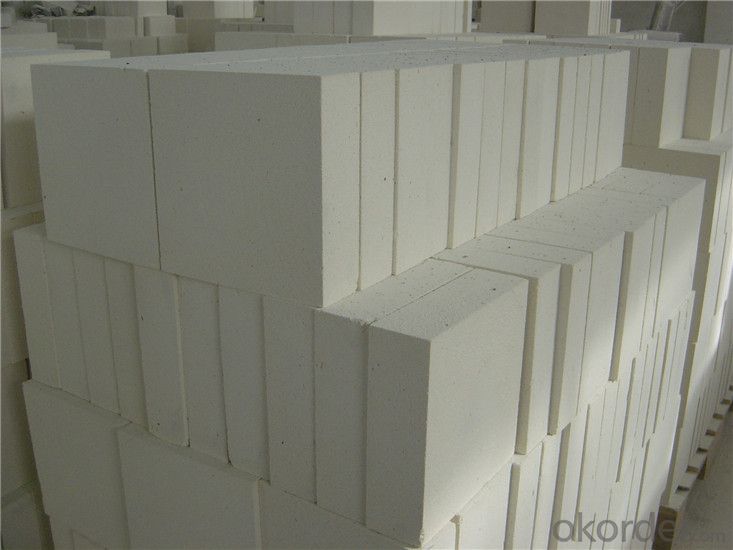
- Q:Are insulating fire bricks easy to cut and shape?
- Indeed, cutting and shaping insulating fire bricks proves to be relatively simple. These bricks consist of lightweight refractory materials like ceramic fibers, enabling them to be more manageable when compared to traditional fire bricks. Common tools such as saws, knives, or chisels can be employed to cut and shape these insulating fire bricks. Due to their lightweight composition, they can be easily maneuvered and positioned, facilitating more accurate cuts and shapes. Moreover, if necessary, openings or specific designs can be effortlessly drilled or carved into these bricks. Overall, the convenience of cutting and shaping insulating fire bricks makes them an ideal choice for various applications in construction, insulation, and fireproofing.
- Q:Are insulating fire bricks resistant to chemical attack?
- Yes, insulating fire bricks are generally resistant to chemical attack. These bricks are made from high-purity refractory materials, such as alumina or silica, which have excellent chemical stability. They are designed to withstand high temperatures and are thus highly resistant to the corrosive effects of chemicals. However, it is important to note that the degree of chemical resistance can vary depending on the specific composition of the insulating fire brick and the type of chemical being used. In some cases, certain aggressive chemicals may still cause some degree of degradation or erosion over time. Therefore, it is always recommended to consult the manufacturer or supplier for specific information regarding the chemical resistance of insulating fire bricks in relation to the intended application.
- Q:Are insulating fire bricks suitable for use in the construction of blast furnaces?
- Yes, insulating fire bricks are suitable for use in the construction of blast furnaces. Insulating fire bricks are made from lightweight materials such as ceramics and have high insulating properties. These bricks have low thermal conductivity, which helps to reduce heat loss and increase efficiency in the blast furnace. Additionally, insulating fire bricks have excellent resistance to thermal shock, meaning they can withstand rapid changes in temperature without cracking or breaking. This is crucial in blast furnace construction, as the intense heat generated in the furnace can cause regular bricks to deteriorate quickly. Insulating fire bricks also have high compressive strength, ensuring their durability and longevity in the harsh conditions of a blast furnace. Overall, the use of insulating fire bricks in blast furnace construction can enhance energy efficiency, improve the performance of the furnace, and prolong its lifespan.
- Q:Can insulating fire bricks be used in industrial furnaces?
- Yes, insulating fire bricks can be used in industrial furnaces. Insulating fire bricks are designed to withstand high temperatures and provide excellent insulation, making them suitable for use in various types of industrial furnaces.
- Q:Can insulating fire bricks be used for fireplace lining?
- Yes, insulating fire bricks can be used for fireplace lining. Insulating fire bricks are specifically designed to withstand high temperatures and provide excellent insulation. They have a low thermal conductivity, which means they can effectively retain heat and prevent excessive heat loss from the fireplace. This makes them an ideal choice for lining fireplaces as they help to increase the efficiency and effectiveness of the heating system. Additionally, insulating fire bricks are also resistant to thermal shock and can withstand rapid temperature changes, which is important in a fireplace where the temperature can fluctuate significantly. Overall, using insulating fire bricks for fireplace lining can improve the performance and energy efficiency of the fireplace while ensuring safety and durability.
- Q:Can insulating fire bricks be used in the construction of flue liners?
- Yes, insulating fire bricks can be used in the construction of flue liners. Insulating fire bricks are designed to withstand high temperatures and provide excellent insulation properties. These bricks are made from lightweight materials such as vermiculite or perlite, which have low thermal conductivity. This makes them ideal for lining flues, as they can help to retain heat and improve the efficiency of the flue system. Additionally, insulating fire bricks are resistant to thermal shock and can withstand rapid temperature changes, which is important in flue applications where the temperatures can fluctuate significantly. Overall, using insulating fire bricks in the construction of flue liners can help to enhance the performance and safety of the flue system.
- Q:Do insulating fire bricks require any special fireproof gaskets or seals?
- No, insulating fire bricks do not require any special fireproof gaskets or seals. Insulating fire bricks are designed to have a high resistance to heat and can withstand high temperatures without the need for additional gaskets or seals. These bricks are typically used in applications such as kilns, furnaces, and fireplaces, where they provide insulation and help retain heat. Their composition and structure allow them to create a barrier against heat transfer, eliminating the need for any additional seals or gaskets. However, it is important to ensure proper installation and alignment of the bricks to ensure a tight fit and maximize their insulating properties.
- Q:Are insulating fire bricks resistant to phosphorus pentoxide?
- Yes, insulating fire bricks are resistant to phosphorus pentoxide.
- Q:Can insulating fire bricks be used for insulation in steel mills?
- Yes, insulating fire bricks can be used for insulation in steel mills. Insulating fire bricks are made from lightweight refractory materials that have excellent insulating properties and can withstand high temperatures. They are designed to minimize heat transfer and maintain the desired temperature inside the furnace or kiln. In steel mills, these bricks can be used to insulate the walls, floors, and roofs of the furnaces, ladles, and other equipment. This insulation helps to reduce heat losses, improve energy efficiency, and ensure consistent and controlled heating processes. Additionally, insulating fire bricks can provide thermal stability and protect the steel mill equipment from excessive heat, contributing to longer equipment lifespan and reduced maintenance costs.
- Q:Can insulating fire bricks be used for insulation in petrochemical plants?
- Insulating fire bricks have multiple applications, one of which is their use in petrochemical plants for insulation purposes. These bricks possess exceptional thermal properties, characterized by their low thermal conductivity and high resistance to heat transfer. These remarkable features render them suitable for deployment in high-temperature environments, such as petrochemical plants. In such settings, insulation plays a critical role in preventing heat loss and maintaining optimal operational conditions. Moreover, these bricks are not only lightweight but also possess robust mechanical strength. This facilitates their easy installation and ensures durability in industrial settings. Additionally, their resistance to chemical corrosion is a crucial attribute for petrochemical plants that handle a wide range of corrosive substances. Consequently, insulating fire bricks effectively fulfill the insulation requirements, thereby enhancing energy efficiency and promoting safety in petrochemical plants.
1. Manufacturer Overview |
|
|---|---|
| Location | |
| Year Established | |
| Annual Output Value | |
| Main Markets | |
| Company Certifications | |
2. Manufacturer Certificates |
|
|---|---|
| a) Certification Name | |
| Range | |
| Reference | |
| Validity Period | |
3. Manufacturer Capability |
|
|---|---|
| a)Trade Capacity | |
| Nearest Port | |
| Export Percentage | |
| No.of Employees in Trade Department | |
| Language Spoken: | |
| b)Factory Information | |
| Factory Size: | |
| No. of Production Lines | |
| Contract Manufacturing | |
| Product Price Range | |
Send your message to us
Standard Size Fire bricks in refractory materials for foundry & Industry
- Loading Port:
- Tianjin
- Payment Terms:
- TT OR LC
- Min Order Qty:
- 20 m.t.
- Supply Capability:
- 10000 m.t./month
OKorder Service Pledge
OKorder Financial Service
Similar products
New products
Hot products
Related keywords
